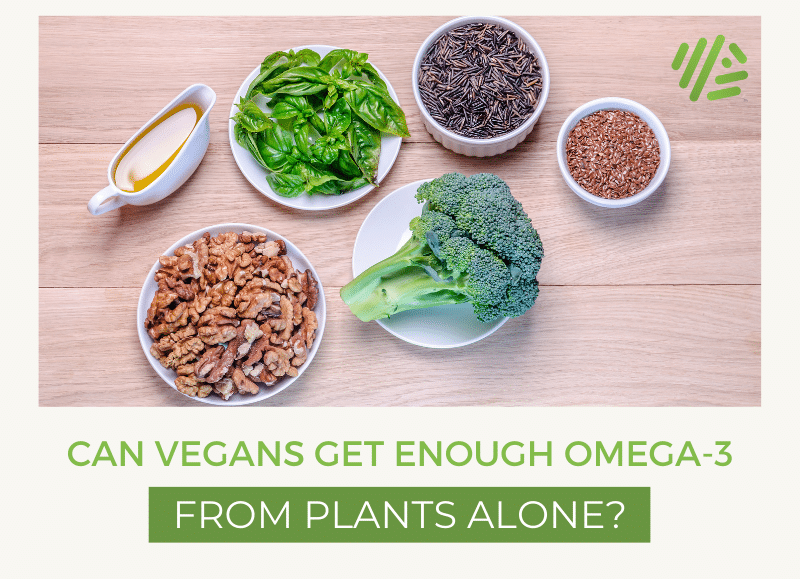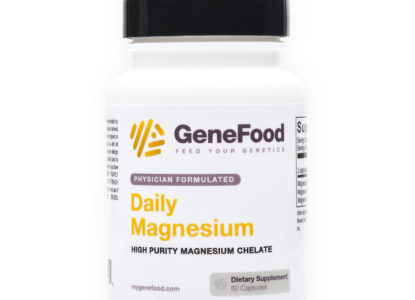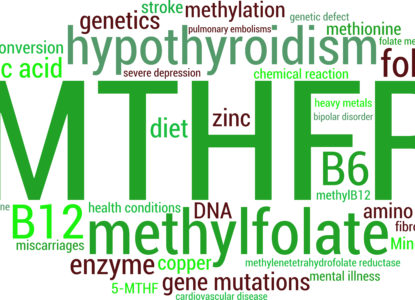Can Vegans Get Enough Omega-3 From Plants Alone?
Genes Mentioned

Contents
Vegan and vegetarian diets are rapidly growing in popularity, and with the diets’ multitude of benefits, it is easy to see why. Even those of us who are not full on vegetarian diets can agree eating less meat is better for the environment and better for our health. However, despite the benefits associated with getting more vegetables in our diets, a plant-based lifestyle is not without its challenges. Regardless of what you think about eating meat, many animal products are nutrient dense. Eliminating whole categories of food carries with it a responsibility to make sure you’re getting key nutrients from other sources. While those who choose a plant-based dietary lifestyle may understand they need to make that trip to the supplement aisle to grab their B-12 supplement, they are often unaware of the challenges associated with getting adequate omega-3 fatty acids on a plant-based diet. The essential fatty acids, eicosapentaenoic acid (EPA) and docosahexaenoic acid DHA, are “essential” for a reason. They are needed for graceful aging , optimal cognitive function, and immune system regulation. They also play a key role in cardiovascular health. 1 2 3 4
Can you get EPA and DHA from plants alone?
The long time vegans out there have an answer to the EPA and DHA problem: get them from plants! In fact, we discussed the issue on the Gene Food Podcast with Dr. Joel Kahn, a well-known vegan cardiologist. To which I say – are you feeling lucky? Yes, it’s true that foods like walnuts, chia seeds, hemp seeds, and flax are high in a type of short chain omega-3 fatty acid called alpha linoleic acid (ALA). When we eat these foods, the body converts the plant-based ALA to the long chain sources of omega-3, EPA and DHA.
DHA is difficult to get from plants alone
Most people who get enough ALA are able to convert enough of these plant derived fats to get adequate EPA, but DHA is another story. A study performed last year looked at EPA and DHA levels in 19 healthy men who were confirmed to be low levels of these essential fatty acids at the start of the trial. The study authors fed the men a diet high in ALA for 12 weeks. What they discovered was rather shocking. Over the course of the 12 week period, the ALA and EPA levels both increased, but the DHA decreased! 5 Vegans and vegetarians should take note. DHA makes up a significant percentage of our brains. 6 You could even call it a “happy fat” as low DHA levels have been linked to increased risk of anxiety and depression. 7 For more, see this Psychology Today blog on the link between vegetarian diets and depression. In short, adequate DHA intake is necessary for optimal cognitive performance at all stages of life. And despite what you may have read on many popular vegan blogs and YouTube channels, the research on conversion of ALA to DHA is mixed, as many papers only discuss minuscule amounts of ALA converting to DHA in the body. In fact, some studies show a zero percent conversion from dietary ALA to DHA in the brain. 8 This means that some plant-based eaters who rely exclusively on ALA in whole foods for their omega-3s will become severely deficient over time.
Differences in omega-3 metabolism
The body’s ability to get enough DHA from plants, like chia seeds and walnuts, is driven by genetics. Variants in the FADS1 gene represent part of the dividing line, with carriers of the G allele for rs174537 doing a better job of getting DHA after eating ALA and carriers of the T allele having more trouble. 9 But don’t celebrate just yet if you have good “vegan genes.” The rub for those of us who carry the G allele is that, while we may be better at getting the omega-3 fats we need from plant sources of ALA, we also tend to convert more of the omega-6 fats we eat into arachidonic acid, an essential polyunsaturated fat that can become pro inflammatory when levels get too high. 10 11
Omega-3 to Omega-6 Ratio and Inflammation
An imbalance of omega-6 fats to omega-3 fats has been theorized as a major cause of the chronic illness epidemic plaguing the United States. The problem for plant-based eaters is that the foods that are high in ALA are often also high in inflammatory omega-6 fats as well. And get this: they compete for the same conversion pathways! So, the result is a kind of metabolic war where the body takes part of the good fat in a food like hemp seeds and makes EPA and some DHA. This is a big victory; score one for our omega-3 levels! However, the omega-6 fats also found in hemp seeds are turned into arachidonic acid at a greater rate, and this competing conversion stream prevents the full synthesis of the omega-3 fats we need for optimal health. For years, studies (that only looked at caucasian populations) found that a small percentage of dietary linoleic acid was converted into arachidonic acid in the body. What these studies failed to account for variants in the FADS1 genes between different ethnicities.
Implications for African American and Mexican communities
What we now know is that African American and Mexican populations tend to carry the “hyper converter” FADS1 gene with more frequency, and that means they get a bigger inflammatory response when they eat omega-6 fats. Because the conversion pathways are shared, the omega-6 fats in their diets also make it harder for these populations to get adequate omega-3. 12
Getting “pure” EPA and DHA as a Vegan
This is why it is so important for all vegetarians, and especially vegans, to get pure forms of EPA and DHA, and really the only game in town is algal oil. This “omega-3 problem” is the reason that even some of the really ardent supporters of plant-based eating, like Dr. Dean Ornish, add fish oil to their regimen. They recognize the importance of the long chain essential fatty acids. For those who want to stay 100% vegetarian or vegan, studies indicate it is possible to get your DHA levels to a healthy place by using algal oil, but be warned, it may take as long as 4 months to get DHA levels to feel good territory. 13 And be double warned, many of the algal oil supplements on the market contain at least some amount of lecithin and sunflower oil, both of which are pro-inflammatory fats, especially in the FADS1 genotypes that were discussed previously.
Key Takeaways
- Maybe the simplest takeaway for vegans who want to stay vegan is to consider an algal oil supplement for a direct source of plant-based EPA and DHA.
- Test. Test. Test. Have your doctor test your EPA and DHA to see where you stand. Every version of 23andme carries the FADS1 SNPs in raw data, so it’s helpful to know your status there as well.
- Vegans and vegetarians are often deficient in essential fatty acids. Not everyone in the plant based community has this issue, but some do, and the percentage of ALA that converts to DHA is often overestimated in vegan circles.
- Those who do a poor job of getting essential fatty acids from plant sources should consider supplementing with DHA all the more strongly. These are the T carriers for FADS1 rs174537. While this means your ability to get essential fatty acids from plants is reduced, it also means you don’t convert omega-6 fats into the ‘bad stuff’ as frequently, so all is not lost.
- African American and Hispanic communities who are carriers of the G allele, may convert plant fats to DHA at a higher rate, but also turn omega-6 fats like vegetable oils into inflammatory bi-products at an accelerated pace. We may be able to get the essential fatty acids we need from plants, which is good news, but we need to walk a “nutritional tightrope” ensuring that a high omega-6 intake doesn’t prevent us from synthesizing EPA and DHA from our favorite fatty acid foods. .
This means being even more mindful about eating a diet that balances omega-3 to omega-6 ratios. We should do our best to exclude vegetable oils, which are the biggest culprits in the rise of omega-6 fats in the Western diet. For example, if you’re eating out, ask whether your salad dressing is made with canola oil, and avoid that entree if the answer is yes. If you eat eggs, find out what the eggs were sautéed in, and order poached eggs whenever possible. No two people synthesize essential fatty acids in the same way, but having some foundational genetic information, and pairing it with the right lab tests, can ensure your plant-based diet is sustainable for a lifetime.




This article has been most helpful to me. I am not a vegan, but still, I wish to avoid sea animals’ oils. Now, about vegetarian diets and depression: I know several persons who are depressed and on prescription drugs. Lo and behold, they are omnivores and always have been.
So, I agree with the overall tone of the article that you link to about vegetarians and depression. However, the author’s conclusion about the relatiohship between depression (not anxiety, just depression) was, basically, “It isn’t all that simple.” So, in your very informative article, nevertheless, you make a bit of an error in linking to that particular article. And while I’m here – meat-eaters are more prone to anxiety.
Thank you so much for all your information.
Thanks for reading, Samia.